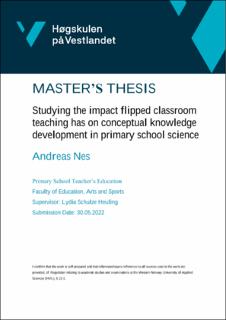Studying the impact flipped classroom teaching has on conceptual knowledge development in primary school science
Master thesis

Åpne
Permanent lenke
https://hdl.handle.net/11250/3017543Utgivelsesdato
2022Metadata
Vis full innførselSamlinger
Sammendrag
In this experimental case study, I compared how the flipped classroom method and the traditional classroom method could impact primary school students’ development of conceptual knowledge in science education. The study took place in one 5th-grade class (n = 11) and three different 7th-grade classes (n = 32) from different schools in Norway. The 5th-grade class participated in a pilot that was conducted to further develop the design, leaving the 7th-grade classes for the main study. Here one class used the flipped classroom method, and two classes used the traditional classroom method.
The teaching was designed to split the lesson into an introductory part and an activity part, with the introduction being the difference between the respective teaching methods. During and after participating in the introduction and the activity, all students were asked to fill out a questionnaire and to create a mind map respectively, depicting the knowledge gained in the lessons, which was then collected for analysis.
The mind maps were analysed using D’Antoni’s Mind Map Analysis Rubric (MMAR), and the results showed that the developed conceptual knowledge of the students had no significant difference between the two teaching methods. As the sample size was relatively small, the case was analysed further using questionnaire answers. From the difference in lesson designs between the teaching methods, the findings could imply that the flipped classroom performed better in this experiment, as the traditional classroom was given more time to learn the same content, without achieving a significantly better performance.
Beskrivelse
Primary School Teacher’s Education
Faculty of Education, Arts and Sports
